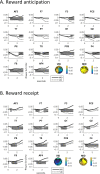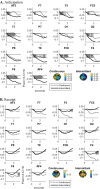EEG to Primary Rewards: Predictive Utility and Malleability by Brain Stimulation
- PMID: 27902711
- PMCID: PMC5130195
- DOI: 10.1371/journal.pone.0165646
EEG to Primary Rewards: Predictive Utility and Malleability by Brain Stimulation
Abstract
Theta burst stimulation (TBS) is thought to affect reward processing mechanisms, which may increase and decrease reward sensitivity. To test the ability of TBS to modulate response to strong primary rewards, participants hypersensitive to primary rewards were recruited. Twenty men and women with at least two opposite-sex, sexual partners in the last year received two forms of TBS. Stimulations were randomized to avoid order effects and separated by 2 hours to reduce carryover. The two TBS forms have been demonstrated to inhibit (continuous) or excite (intermittent) the left dorsolateral prefrontal cortex using different pulse patterns, which links to brain areas associated with reward conditioning. After each TBS, participants completed tasks assessing their reward responsiveness to monetary and sexual rewards. Electroencephalography (EEG) was recorded. They also reported their number of orgasms in the weekend following stimulation. This signal was malleable by TBS, where excitatory TBS resulted in lower EEG alpha relative to inhibitory TBS to primary rewards. EEG responses to sexual rewards in the lab (following both forms of TBS) predicted the number of orgasms experienced over the forthcoming weekend. TBS may be useful in modifying hypersensitivity or hyposensitivity to primary rewards that predict sexual behaviors. Since TBS altered the anticipation of a sexual reward, TBS may offer a novel treatment for sexual desire problems.
Conflict of interest statement
The authors have declared that no competing interests exist.
Figures






Similar articles
-
Reversing the Atypical Valuation of Drug and Nondrug Rewards in Smokers Using Multimodal Neuroimaging.Biol Psychiatry. 2017 Dec 1;82(11):819-827. doi: 10.1016/j.biopsych.2017.01.015. Epub 2017 Jan 27. Biol Psychiatry. 2017. PMID: 28314439
-
Theta burst stimulation of the prefrontal cortex: safety and impact on cognition, mood, and resting electroencephalogram.Biol Psychiatry. 2009 May 1;65(9):778-84. doi: 10.1016/j.biopsych.2008.10.029. Epub 2008 Dec 13. Biol Psychiatry. 2009. PMID: 19070834 Clinical Trial.
-
Beyond the Motor Cortex: Theta Burst Stimulation of the Anterior Midcingulate Cortex.Biol Psychiatry Cogn Neurosci Neuroimaging. 2020 Nov;5(11):1052-1060. doi: 10.1016/j.bpsc.2020.06.009. Epub 2020 Jun 27. Biol Psychiatry Cogn Neurosci Neuroimaging. 2020. PMID: 32839154
-
Mechanisms and applications of theta-burst rTMS on the human motor cortex.Brain Topogr. 2010 Jan;22(4):294-306. doi: 10.1007/s10548-009-0084-7. Epub 2009 Mar 14. Brain Topogr. 2010. PMID: 19288184 Review.
-
Electrophysiological underpinnings of reward processing: Are we exploiting the full potential of EEG?Neuroimage. 2021 Nov 15;242:118478. doi: 10.1016/j.neuroimage.2021.118478. Epub 2021 Aug 14. Neuroimage. 2021. PMID: 34403744 Review.
Cited by
-
Development and validation of the Canine Reward Responsiveness Scale -Examining individual differences in reward responsiveness of the domestic dog.Sci Rep. 2018 Mar 13;8(1):4421. doi: 10.1038/s41598-018-22605-1. Sci Rep. 2018. PMID: 29535396 Free PMC article.
-
Inhibit My Disinhibition: The Role of the Inferior Frontal Cortex in Sexual Inhibition and the Modulatory Influence of Sexual Excitation Proneness.Front Hum Neurosci. 2018 Jul 26;12:300. doi: 10.3389/fnhum.2018.00300. eCollection 2018. Front Hum Neurosci. 2018. PMID: 30093856 Free PMC article.
-
Improving the quality of a collective signal in a consumer EEG headset.PLoS One. 2018 May 24;13(5):e0197597. doi: 10.1371/journal.pone.0197597. eCollection 2018. PLoS One. 2018. PMID: 29795611 Free PMC article.
-
Low Cost MR Compatible Haptic Stimulation with Application to fMRI Neurofeedback.Brain Sci. 2020 Oct 28;10(11):790. doi: 10.3390/brainsci10110790. Brain Sci. 2020. PMID: 33126691 Free PMC article.
-
Effect of Experimental Manipulation of the Orbitofrontal Cortex on Short-Term Markers of Compulsive Behavior: A Theta Burst Stimulation Study.Am J Psychiatry. 2021 May 1;178(5):459-468. doi: 10.1176/appi.ajp.2020.20060821. Epub 2021 Mar 17. Am J Psychiatry. 2021. PMID: 33726523 Free PMC article.
References
-
- Torrubia R, Ávila C, Moltó J, Caseras X. The Sensitivity to Punishment and Sensitivity to Reward Questionnaire (SPSRQ) as a measure of Gray's anxiety and impulsivity dimensions. Personality and Individual Differences. 2001;31(6):837–62.
MeSH terms
LinkOut - more resources
Full Text Sources
Other Literature Sources
Miscellaneous

